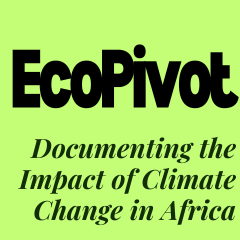Awal Hakim had returned to Garu with the simple intention of visiting his ancestral home, but the land he encountered seemed more foreign than familiar.
It wasn’t the warm embrace of a place steeped in tradition that greeted him, but a harsh landscape ravaged by forces much larger than human hands. The trees that once stood tall and proud were gone, uprooted in a brutal dance of survival that left the soil exposed and houses tilting precariously.
The roads had turned into a network of craters—deep, gaping holes that bore witness to an ongoing sacrilege, a relentless assault on the land.
“I witnessed the consequences of desertification in my family’s hometown of Garu,” Awal told EcoPivot. “Our crops struggle to thrive, the greens and vegetables didn’t grow well due to lack of rain, and it all boils down to cutting down trees without replacing them.”
In Garu, the relentless march of desertification was as visible as the scars on the land itself. The rains had all but abandoned the community, leaving in their wake a barren landscape where little could survive.

Galamsey: The Unwelcome Intruder
For years, galamsey has plagued Ghana’s landscape like an unwelcome guest. These unauthorized miners, armed with nothing more than rudimentary tools and an insatiable hunger for gold, dig shallow pits into the earth, bleeding the land dry. Yet regardless of the method, the damage remains the same—a gouging out of the land’s lifeblood.
“Illegal mining (galamsey) has become a bane to Ghana’s development in terms of climate change,” Awal lamented. His words carried the weight of a community’s growing despair. “It is a disease that is causing more harm than what corona did, as all our forests and major water bodies are being destroyed.“
Galamsey employs up to 60 percent of Ghana’s mining workforce, a lifeline for thousands of people. But the very activity that brings food to the table also strips the land bare, leaving behind environmental devastation.
Regions like Garu, Bawku, Tempani, and Wechiau have borne the brunt of these illegal activities. The rivers, once sources of life and sustenance, are now contaminated. The land is scarred with craters and stripped of its once vibrant vegetation. As the earth bleeds, so do the communities that depend on it.
Concerns for Ghana’s Future
Awal believes the future Ghana faces is a perilous one. The unchecked advance of galamsey threatens not just the environment but the very existence of its people. Water sources across the country are tainted with mercury and arsenic chemicals that leach into the soil and slowly poison everything they touch.
Scientists warn that if nothing is done to halt this environmental catastrophe, Ghana may have to start importing clean water by 2030. For the millions who live near these poisoned waters, the clock is already ticking.
Cry for help
Awal knew that his voice alone wouldn’t be enough to turn back the tide. But he couldn’t sit idly by as his beloved Ghana withered under the weight of destruction.
“I am a tree lover, and I pride myself as the only man who loves trees more than monkeys,” he told EcoPivot. For Awal, trees weren’t just a passion; they were a lifeline, the last defense against an encroaching desert.

His love for trees took him on an unusual journey—an attempt to break the Guinness World Record for the longest time hugging a tree. “I embarked on GWR to set a pace for how humanity can raise awareness of the invaluable contribution of trees to our society,” he explained. “This is not just a record attempt, but a means to educate Ghanaians on the effect of climate change.“
The path to his eventual record attempt on May 23 was not an easy one. He had to practice for months, building up the stamina needed to hug a tree for 48 hours straight. “It was awesome,” Awal recalled. “I felt like I had to do something to create impact and awareness.“
Despite battling funding challenges and limited support from local authorities, Awal persevered, his resolve unshaken even by the punishing rainstorms that tried to derail his attempt.
His activism didn’t end with his record-breaking hug. Inspired by the success of his feat, he conceived the 1-Minute-A-Tree initiative. For every minute he spent hugging a tree, he pledged to plant one new species across Ghana—a symbolic gesture but one rooted in the urgent need for action. That meant 1,440 new species of trees, each planted with the hope of restoring a bit of what galamsey and deforestation had taken away.
“Trees contribute a lot to humanity,” Awal emphasised, his tone growing more urgent. “They say when the last tree dies, the last man also dies. Trees give us oxygen, and we give them carbon dioxide. When we cut all the trees, we cannot get oxygen to breathe.“


